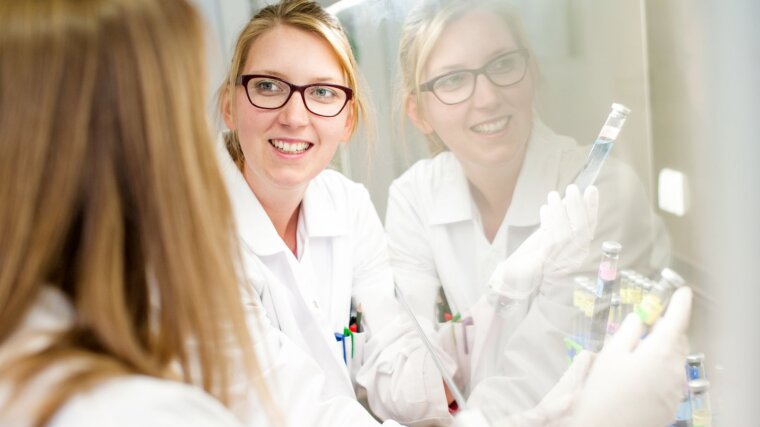
Programme content
There are so many wonderful treasures around us, and yet people hardly ever notice them. There are so many little lifeforms wriggling right beneath our feet— significantly more than on the earth. The soil is not just part of the ground; it is the basis of our very existence and is subjected to increasing levels of stress from monocultures, roads, houses and over-pollution. As a result, the diversity within and between animal and plant species, ecosystems and agricultural regions is under threat.
The contaminated sites of mining companies and manufacturing industries are also posing significant challenges to society: How can contaminated areas be restored? Environmental protection concerns us all—but especially bio-geoscientists! After all, such problems can no longer be solved by individual disciplines like chemistry, geology or biology alone—we have to establish interdisciplinary networks.
If you enrol on the bachelor’s programme in ‘Biogeosciences’, you will take a close look at nature, the environment and related changes. Over the course of six semesters, you will acquire theoretical and practical skills in the basic subjects of mathematics and physics, as well as advanced training in chemistry. You will then be able to further develop your expertise with extensive theoretical and practical content from the fields of earth sciences (e.g. hydrogeology, environmental chemistry, soil science) und biosciences (e.g. limnology, microbiology).
Digital discovery tour with free app: Would you like to find out more about our degree in Biogeosciences with fun quiz questions and puzzles? Click here for our interactive discovery tour app [in German].
Structure
The bachelor's degree is the first professional qualification. The standard period of study is a total of six semesters, during which various forms of courses (e.g. seminars, lectures or practical courses) are offered for the individual modules.
If you take a single-subject bachelor’s programme in ‘Biogeosciences’, your field of study will comprise 180 credits (ECTS for short; 1 ECTS = 30 hours for attendance, preparation and follow-up work, private study, assessed coursework and examinations).
In addition to the range of courses offered at the University of Jena, students also have the opportunity to attend certain courses at the Jena University of Applied SciencesExternal link and integrate them in their own study plan.
Special emphasis is placed on practical skills, which can be acquired through a wide range of field trips during the study programme, allowing you to observe environmental processes in nature and gain a better understanding of them. A six-week vocational internship towards the end of your studies will also give you an insight into typical areas of employment and provide you with some contacts in the world of work.
How might your degree programme shape up?
| Modules — semester | 1st | 2nd | 3rd | 4th | 5th | 6th |
| Experimental Physics | 8 ECTS | |||||
| Mathematics | 6 ECTS | |||||
| Chemistry: Inorganic, Organic and Analytical Chemistry | 6 ECTS | 10 ECTS | 6 ECTS | 6 ECTS | ||
| Earth Sciences: Surface Processes and Applied Geology, Hydrogeology, Environmental Geochemistry, Quaternary Geology / Soil Science |
9 ECTS | 11 ECTS | 17 ECTS | |||
| Biology: Botany, Limnology General Ecology, Microbiology | 5 ECTS | 25 ECTS | ||||
| Bio-Geo Interactions | 5 ECTS | 6 ECTS | ||||
| Required elective modules* | 30 ECTS | 10 ECTS | ||||
| Vocational Internship | 8 ECTS | |||||
| Bachelor’s Thesis | 12 ECTS | |||||
Short form: ECTS = credit points (European Credit Transfer System)
* You can choose from around 30 optional modules in the areas of Earth Sciences and Biology at the University of Jena, and in the areas of Environmental and Energy Technology at the Jena University of Applied SciencesExternal link
More detailed information can be found in the module catalogue for the study programme [in German]External link.
Why study in Jena?
- Bio-geo interactions: You will be able to establish close connections between the areas of biosciences and earth sciences in courses created especially for the study programme.
- Large selection of elective modules: Thanks to our teaching cooperation with the Jena University of Applied Sciences, you can also take vocational modules in the fifth semester (e.g. marketing, wastewater treatment, process engineering, environmental management).
- Outstanding research: The relationships between plant diversity and ecosystem processes are being investigated in the Jena ExperimentExternal link, where artificially arranged grasslands are growing in trial plots on a ten-hectare site in the floodplains of the River Saale. The project is one of the world’s largest biodiversity experiments.
- Integrated vocational internship: You can get an insight into typical areas of employment during a six-week internship.
- Close cooperation: You can take advantage of our University’s ties to internationally renowned research institutions based in Jena, including the Max Planck Institute for Chemical EcologyExternal link.
- Adventures abroad: You can easily realize your dream of completing a semester abroad. Our university has a global network of partner universities.
What can you do after your studies?
Prof. Dr. Thorsten Schäfer
Image: Anne Günther (University of Jena)As bio-geoscientists have geoscientific and biological expertise, they combine two important disciplines in one person. Your vocational internship will help you make contacts, such as with engineering offices and environmental agencies.
Prof. Dr Thorsten Schäfer, Professor of Applied Geology
Areas of employment for graduates
- water management, urban planning and environmental agencies
- engineering offices for subsoil analysis, hydrogeology, clean-up of contaminated sites
- oil and gas industry, raw material supplies
- research coordination / research institutes
- public relations, museums, geoparks
reports from our Biogeosciences graduates [in German]External link
Downloads and links for the degree programme
What are we looking for in prospective students?
- interest in scientific issues and interdisciplinary thinking
- good knowledge of biology, chemistry, physics and mathematics
- basic computer skills
Admission requirements
-
University entrance qualification
A university entrance qualification, such as a general secondary school leaving certificate, is required for admission onto the study programme.
More information on university entrance qualifications can be found here.
-
Language requirements
The study programme is taught in German. You must therefore have a very good command of German at the start of the study programme.
Good proficiency in English is required. Students must submit evidence of their language skills (except German—see above) when registering the subject of their bachelor’s thesis at the latest.
Contacts
Room H118
Burgweg 11
07749 Jena
Google Maps site planExternal link
Burgweg 11
07743 Jena
Google Maps site planExternal link
Opening hours:
by arrangement
Humboldtstraße 11
07743 Jena
Google Maps site planExternal link
University Main Building / SSZ
Fürstengraben 1
07743 Jena
Google Maps site planExternal link
Office hours:
The Central Student Advisory Service will be closed from 22 December 2025 to 2 January 2026. We will be happy to assist you again from 5 January 2026!
We offer consultations in person, by telephone, and via Zoom. You can make an appointment by calling us on +49 3641 9-411111 (Mondays to Fridays from 9:00 to 11:00) or outside these office hours on +49 3641 9-411200. You can also use our remote help desk.
Consultation hours:
Mondays, Tuesdays, Thursdays and Fridays (9:00 to 12:20), Tuesdays (14:00 to 18:00), and Wednesdays and Thursdays (14:00 to 16:00).
Video chat: To the video chat – Zoom Videochat ZeitenMondays to Fridays (12:30 to 13:00) Password ZSB2020 Data protection informationpdf, 101 kb
University Main Building, Room E065
Fürstengraben 1
07743 Jena
Google Maps site planExternal link
Opening hours:
Information Desk (UHG; Room E0.65)
Mondays (10:00 – 12:00)
Tuesdays (13:00 – 15:00)
Wednesdays (10:00 – 12:00)
Thursdays (13:00 – 15:00)
Fridays (10:00 – 12:00)
You can also use our remote help desk at
www.uni-jena.de/service-ssz
or send us your enquiries by post.
Telephone hours:
Mondays to Fridays
(9:00 – 11:00)
Postal address:
Friedrich-Schiller-Universität Jena
Studierenden-Service-Zentrum
07737 Jena
University Main Building
Fürstengraben 1
07743 Jena
Google Maps site planExternal link
